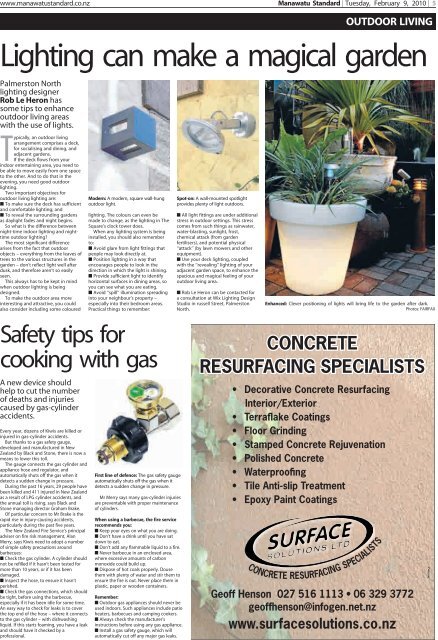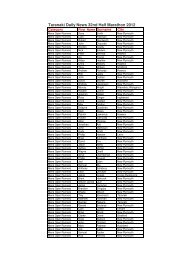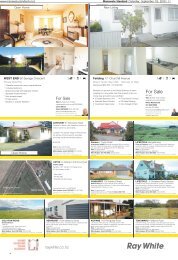This Year's Trends - Stuff
This Year's Trends - Stuff
This Year's Trends - Stuff
Create successful ePaper yourself
Turn your PDF publications into a flip-book with our unique Google optimized e-Paper software.
www.manawatustandard.co.nz Manawatu Standard Tuesday, February 9, 2010 5<br />
OUTDOOR LIVING<br />
Lighting can make a magical garden<br />
Palmerston North<br />
lighting designer<br />
Rob Le Heron has<br />
some tips to enhance<br />
outdoor living areas<br />
with the use of lights.<br />
Typically, an outdoor living<br />
arrangement comprises a deck,<br />
for socialising and dining, and<br />
adjacent gardens.<br />
If the deck flows from your<br />
indoor entertaining area, you need to<br />
be able to move easily from one space<br />
to the other. And to do that in the<br />
evening, you need good outdoor<br />
lighting.<br />
Two important objectives for<br />
outdoor living lighting are:<br />
■ To make sure the deck has sufficient<br />
and comfortable lighting; and<br />
■ To reveal the surrounding gardens<br />
as daylight fades and night begins.<br />
So what is the difference between<br />
night-time indoor lighting and nighttime<br />
outdoor lighting?<br />
The most significant difference<br />
arises from the fact that outdoor<br />
objects – everything from the leaves of<br />
trees to the various structures in the<br />
garden – don’t reflect light well after<br />
dusk, and therefore aren’t so easily<br />
seen.<br />
<strong>This</strong> always has to be kept in mind<br />
when outdoor lighting is being<br />
designed.<br />
To make the outdoor area more<br />
interesting and attractive, you could<br />
also consider including some coloured<br />
Modern: A modern, square wall-hung<br />
outdoor light.<br />
lighting. The colours can even be<br />
made to change, as the lighting in The<br />
Square’s clock tower does.<br />
When any lighting system is being<br />
installed, you should also remember<br />
to:<br />
■ Avoid glare from light fittings that<br />
people may look directly at.<br />
■ Position lighting in a way that<br />
encourages people to look in the<br />
direction in which the light is shining.<br />
■ Provide sufficient light to identify<br />
horizontal surfaces in dining areas, so<br />
you can see what you are eating.<br />
■ Avoid ‘‘spill’’ illumination spreading<br />
into your neighbour’s property –<br />
especially into their bedroom areas.<br />
Practical things to remember:<br />
Spot-on: A wall-mounted spotlight<br />
provides plenty of light outdoors.<br />
■ All light fittings are under additional<br />
stress in outdoor settings. <strong>This</strong> stress<br />
comes from such things as rainwater,<br />
water-blasting, sunlight, frost,<br />
chemical attack (from garden<br />
fertilisers), and potential physical<br />
‘‘attack’’ (by lawn mowers and other<br />
equipment).<br />
■ Use your deck lighting, coupled<br />
with the ‘‘revealing’’ lighting of your<br />
adjacent garden space, to enhance the<br />
spacious and magical feeling of your<br />
outdoor living area.<br />
■ Rob Le Heron can be contacted for<br />
a consultation at Wix Lighting Design<br />
Studio in russell Street, Palmerston<br />
North.<br />
Enhanced: Clever positioning of lights will bring life to the garden after dark.<br />
Photos: FAIRFAX<br />
Safety tips for<br />
cooking with gas<br />
A new device should<br />
help to cut the number<br />
of deaths and injuries<br />
caused by gas-cylinder<br />
accidents.<br />
very year, dozens of Kiwis are killed or<br />
njured in gas-cylinder accidents.<br />
But thanks to a gas safety gauge,<br />
developed and manufactured in New<br />
Zealand by Black and Stone, there is now a<br />
means to lower this toll.<br />
The gauge connects the gas cylinder and<br />
appliance hose and regulator, and<br />
automatically shuts off the gas when it<br />
detects a sudden change in pressure.<br />
During the past 16 years, 29 people have<br />
been killed and 411 injured in New Zealand<br />
as a result of LPG cylinder accidents, and<br />
the annual toll is rising, says Black and<br />
Stone managing director Graham Brake.<br />
Of particular concern to Mr Brake is the<br />
rapid rise in injury-causing accidents,<br />
particularly during the past five years.<br />
The New Zealand Fire Service’s principal<br />
adviser on fire risk management, Alan<br />
Merry, says Kiwis need to adopt a number<br />
of simple safety precautions around<br />
barbecues:<br />
■ Check the gas cylinder. A cylinder should<br />
not be refilled if it hasn’t been tested for<br />
more than 10 years, or if it has been<br />
damaged.<br />
■ Inspect the hose, to ensure it hasn’t<br />
perished.<br />
■ Check the gas connections, which should<br />
be tight, before using the barbecue,<br />
especially if it has been idle for some time.<br />
An easy way to check for leaks is to cover<br />
the top end of the hose – where it connects<br />
to the gas cylinder – with dishwashing<br />
liquid. If this starts foaming, you have a leak<br />
and should have it checked by a<br />
professional.<br />
First line of defence: The gas safety gauge<br />
automatically shuts off the gas when it<br />
detects a sudden change in pressure.<br />
Mr Merry says many gas-cylinder injuries<br />
are preventable with proper maintenance<br />
of cylinders.<br />
When using a barbecue, the fire service<br />
recommends you:<br />
■ Keep your eyes on what you are doing.<br />
■ Don’t have a drink until you have sat<br />
down to eat.<br />
■ Don’t add any flammable liquid to a fire.<br />
■ Never barbecue in an enclosed area,<br />
where excessive amounts of carbon<br />
monoxide could build up.<br />
■ Dispose of hot coals properly. Douse<br />
them with plenty of water and stir them to<br />
ensure the fire is out. Never place them in<br />
plastic, paper or wooden containers.<br />
Remember:<br />
■ Outdoor gas appliances should never be<br />
used indoors. Such appliances include patio<br />
heaters, barbecues and camping cookers.<br />
■ Always check the manufacturer’s<br />
instructions before using any gas appliance.<br />
■ Install a gas safety gauge, which will<br />
automatically cut off any major gas leaks.<br />
CONCRETE<br />
RESURFACING SPECIALISTS<br />
• Decorative Concrete Resurfacing<br />
Interior/Exterior<br />
• Terraflake Coatings<br />
• Floor Grinding<br />
• Stamped Concrete Rejuvenation<br />
• Polished Concrete<br />
• Waterproofing<br />
• Tile Anti-slip Treatment<br />
• Epoxy Paint Coatings<br />
CONCRETE RESURFACING SPECIALISTS<br />
Geoff Henson 027 516 1113 • 06 329 3772<br />
geoffhenson@infogen.net.nz<br />
www.surfacesolutions.co.nz<br />
2471728AA















